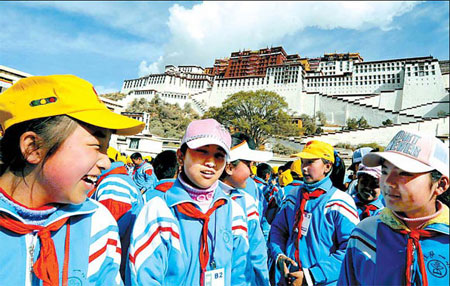Tibetans hold top government posts
(China Daily)
Updated: 2008-04-17 08:53
Updated: 2008-04-17 08:53
Born into a herding family in a remote village, 49-year-old Sori, now the vice-director of the Tibetan autonomous region seismological bureau, said he never could have imagined how much his life was about to change the day he was chosen to study at a local institute.
 Students from the Lhasa No.1 Primary school visit a museum near the Potala Palace in Lhasa Wednesday. [Xinhua] |
Sori was 13 in 1972, when he and other poor children from all over Tibet entered the Tibet Nationalities Institute where. On completion, he moved to the Changchun Geological Institute and later become an official, one of the first to have had a formal education.
Sori is just one of the many Tibetan people who grew up with support from the central government and is now helping to steer the region.

Today, about 70 percent of all regional-level officials are Tibetan and from other ethnic minorities. Tibetans hold the top positions in the government and the region's judicial organs. Within the 74 counties and prefectures and 682 towns, 86 percent of officials are Tibetan or from ethnic minority groups.
Yin Deming, head of the regional organization bureau, which is in charge of cadre selection, said ethnic minority people, especially Tibetans, have become the backbone of the leadership at all levels in Tibet.
As well as studying at some of the country's most prestigious universities, many Tibetan cadres were trained at leading training schools such as the Party School of the Central Committee of Communist Party of China and the National School of Administration.
Chen Fu, a 53-year-old head teacher of the Tibet Cadre Class at the CPC Party School, said 1,446 Tibetan cadres have been trained in his class in 36 sessions since the class was set up in 1980.
The central government has continuously adjusted the curriculum of the class to ensure it stays in line with the latest developments in Tibet. And the quality of his students is getting better all the time, he said.
"In the past, we had to include lots of literacy classes because many of the trainees were barely able to read or write. There was no decent education in Tibet before the late 70s.
"And now, our students generally hold college degrees and the class can focus on the theoretical and policy study," Chen sid.
|
||
|
||
|
|
|
|

